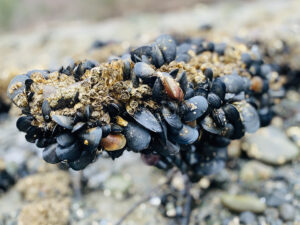AZA SAFE North American Freshwater Mussel
Zoos and aquariums like Butterfly Pavilion are teaming up to protect the 303 freshwater species across north America and Canada that are in dire need of protection. The biggest threat to freshwater mussels is habitat destruction and fragmentation.
The Association of Zoos and Aquariums (AZA) launched its Saving Animals From Extinction (SAFE) initiative for North American Freshwater Mussels in September 2023. Butterfly Pavilion is honored to be among the inaugural members of this crucial effort! There are 303 recognized freshwater mussel species in the United States and Canada, and there is an urgent need for research, recovery and restoration, education, and advocacy on behalf of these vital indicator species for freshwater ecosystems. There are three native species of freshwater mussel in Colorado: the giant floater (Pyganodon grandis), cylindrical papershell (Anodontoides ferussacianus), and pond horn (Uniomerus tetralasmus). The decline in their populations within our state underscores the critical importance of studying them.
The biggest threat to freshwater mussels is habitat destruction and fragmentation. Human made barriers such as dams can restrict the movement of host species the mussels rely on for their reproduction and growth and diversion of water can lead to important habitat drying up with the mobility challenged mussels left behind. Mussels are also sensitive to worsening water quality leading to decline. Invasive species, like zebra and quagga mussels, also impact native populations leading to decline as they are outcompeted.
Mussels are incredibly powerful filter feeders, often responsible for keeping waterways free of free-floating algae and detritus. Without their presence water clarity and quality can diminish leading to decline in other species. This ability has given them the nickname ‘The Liver of the River’. In addition, they are valuable food sources for a variety of aquatic and terrestrial species. Even humans relied heavily on native freshwater mussels and were used in trade, with shells being used for everyday objects like buttons.
Freshwater mussels are among the most imperiled group of animals in the world. Nearly 65% of North American species are considered endangered. The United States has the highest number of mussel species in the world with close to 300 species, compared to less than 20 species found in other countries around the world. The Center for Biological Diversity has called freshwater mussels “the most endangered organisms in North America.
To support programs like SAFE’s North American Fresh Water Mussel restoration, visit Butterfly Pavilion to today and learn more!






